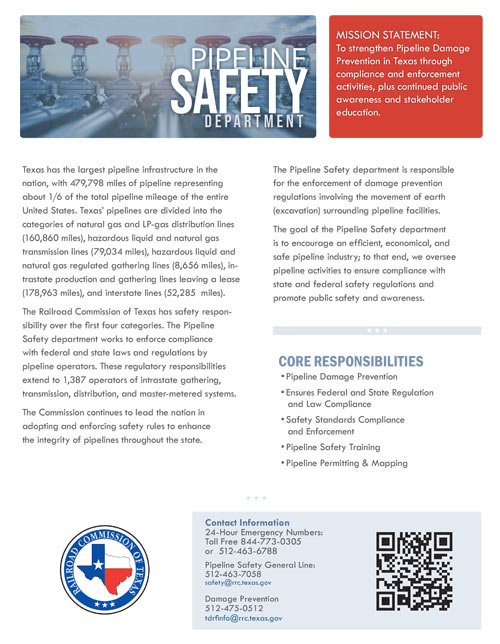
Texas Pipeline Damage Prevention Statistics
Pipeline Safety ANNOUNCEMENTS
Notice to Oil & Gas and Pipeline Operators
Winter Weather OutlookJanuary 20, 2026
The National Weather Service is predicting a significant winter weather event in Texas beginning Friday and continuing through the weekend. Heavy winter precipitation is possible, with the first round expected late Friday as a strong cold front moves into the state. Much colder air will spread from north to south overnight, with the greatest impacts expected across the central half of Texas.
Many areas may experience lows in the teens and single digits, with wind chill values dropping into the single digits across much of the state. Similar conditions are expected to continue through the weekend.
The Railroad Commission of Texas (RRC) advises all operators under the RRC’s jurisdiction in areas of potential impact to take the following actions:
- Monitor local, state and national weather reports for updates on potential severe weather impacts;
- Heed all watches, warnings and orders issued by local emergency officials;
- Secure all personnel, equipment and facilities to prevent injury or damage; and
- Monitor and prepare operations for potential impacts, as safety permits.
The RRC maintains a 24-hour, toll-free emergency line, 844-773-0305, to report emergencies, including leaks or spills and damage to gas pipelines.
In addition, the RRC advises all operators to monitor road conditions during the weather event. Operators can find weather emergency resources including road conditions, TxDOT live traffic cameras and weather advisories and warnings https://www.rrc.texas.gov/weather.
To view the full notice, visit the RRC website at https://www.rrc.texas.gov/media/gbbjgfqn/012026-notice-to-operators-winter-weather-january-2026.pdf
What we do
The Oversight and Safety Division has responsibility for Alternative Fuels, Gas Services and Pipeline Safety. This reorganization in January 2015 will bring even greater efficiency and consistency to these operations within the Railroad Commission of Texas (RRC), allowing the agency to better serve the state.
Texas has the largest pipeline infrastructure in the nation, representing about 1/6 of the total pipeline mileage of the entire United States. Texas’ pipelines are divided into the categories of natural gas and LP-gas distribution lines, hazardous liquid and natural gas transmission lines, hazardous liquid and natural gas regulated gathering lines, intrastate production and gathering lines leaving a lease, and interstate lines. The RRC has safety responsibility over the first four categories.
Pipelines that cross between states are considered Interstate and would be under the jurisdiction of the U.S. Dept. of Transportation (DOT) - Pipeline and Hazardous Materials Safety Administration (PHMSA). The PHMSA southwest regional office located in Houston covers Arkansas, Louisiana, New Mexico, Oklahoma, and Texas.
The Pipeline Safety department works to enforce compliance with federal and state laws and regulations by pipeline operators. These regulatory responsibilities extend to operators of intrastate gathering, transmission, distribution, and master-metered systems. The RRC continues to lead the nation in adopting and enforcing safety rules to enhance the integrity of pipelines throughout the state.
Pipeline Safety rules administered by the RRC are adopted in the Texas Administrative Code, containing State specific requirements and incorporates by reference the minimum Federal safety standards for transportation of gas and hazardous liquids by pipeline and liquefied natural gas facilities.
The RRC also promotes and enforces an underground pipeline damage prevention program for Texas. The Pipeline Safety department is responsible for the enforcement of damage prevention regulations involving the movement of earth (excavation) surrounding pipeline facilities.
The goal of the Pipeline Safety department is to encourage an efficient, economical, and safe pipeline industry; to that end, we oversee pipeline activities to ensure compliance with state and federal safety regulations and promote public safety and awareness.







